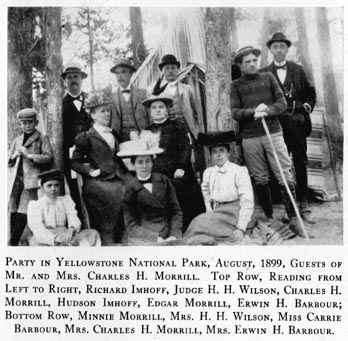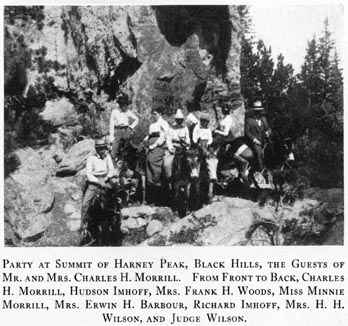[114]
THE MORRILLS AND REMINISCENCES


|
© 2002 for the NEGenWeb Project by Pam Rietsch, Ted & Carole Miller.
|
||||
NEGenWeb Project
Resource Center
On-Line Library
families. The owner of the land erects no buildings, he simply gives the peons the right to occupy enough ground upon which to put their houses. The peon generally begins with a brush house, consisting of one small room, just large enough in which to sleep. The cooking is all done over charcoal fires and the family sit on the ground while eating. Beds are also made on the ground, which is covered with straw; as the weather is warm they require only one or two cotton blankets. The land owner contributes nothing toward the support of the peon and his family but the wages paid. If the wage is fifteen cents per day, and is not sufficient to support him, the peon must ask advances of his employer and every advance makes it more impossible for him to ever free himself from peonage. I met a party of Americans who were the owners of mines and stock ranches in Mexico. They informed me that Mexican laborers in their employ performed about the same amount of work a day or month as American laborers employed on ranches owned in Texas.
As far as my observations went, the Mexicans seemed to be an industrious people but they did not try to conceal their hatred for the Americans. I was cautioned by Mexican officials that it was not safe for me to be in the outskirts of the city at night.
On market days many Indians came with pottery of their own manufacture, made into cooking utensils and vessels of various kinds. Much of this ware was decorated by inlaying bits of porcelain and crockery in the clay, arranged in ornamental designs. I was told that
[111]
these Indians were direct descendants of the Aztecs. They manufactured cloth sufficient for their clothing and many fancy blankets, known as zepropas, which they sold. They seemed to be more intelligent and more industrious than our American Indians. I had been told that the Aztecs never laughed and my observations while among them verified this statement. I do not remember ever having seen a smile on one of their faces. At morning and evening the young squaws sat by the roadside cooking a kind of bread they call tortilla; this they offered for sale. There were many young Indian and Mexican boys among those who purchased and I watched them closely but never saw a smile, or any indication that seller or purchaser had a thought other than that of the commercial transaction. These Indians were all Catholics.
On one occasion I saw a large number of men passing our hotel, carrying bricks on their backs. On inquiry I was told that these men were carrying the bricks three miles distant for the construction of a building. Every morning an old woman, possibly past seventy-five years of age, came to the hotel. She went to the clerk, handing him one egg. I was told that she received three centavos for the egg. The landlord told me that the old woman kept but one hen and that the money she received for eggs was nearly sufficient to purchase food for both herself and the hen.
I told my interpreter I would like very much to form the acquaintance of a Mexican family of eight or ten people, my object being to get information as to the
[112]
cost of supporting such a family in Mexico. Later on he informed me that he had found among his friends, a family of ten where the husband received thirty centavos per day for his labor. For the consideration of one dollar the husband and wife agreed to allow me, with my interpreter, to accompany the wife to market, where she was to purchase food sufficient to feed the family for one day. I was also to have the privilege of going to the house and watching the preparation of the food. At the market she made the following purchases: Indian corn, four centavos, about one quart; colored beans, four centavos, one pint; pork, one centavo, one ounce; salt, one half centavo; chili pepper, one half centavo, one cupful; beef, three centavos; lard, one centavo. These purchases were all weighed on small balance scales, such as are sometimes seen in drug stores in the United States. The entire purchase amounted to fourteen centavos, or eight cents in American money. At home the beans were put into a kettle, also the pork and beef, after being cut into small bits; the full cup of chili pepper was then added, and the mixture seasoned with salt. This made about ten quarts of soup. The corn was boiled until soft, then placed on a stone slab and crushed into a sort of dough with a stone roller. The dough, upon being fried, formed the bread called tortilla. I was told that the husband purchased daily ten centavos worth of pulque which he brought home and shared with the family. Pulque is the national Mexican drink, which is taken from the century plant and sold while fresh.
[113]
This constituted the entire supply of food for a family of ten for one day, leaving six centavos for the purchasing of the family clothing.
Three times each week a young Mexican came to the hotel with a load of wood on his back. The landlord informed me that he paid twenty-five centavos for the wood. Through my interpreter I questioned the Mexican wood seller. His home was seven miles away. He paid five centavos for the wood and it took him two days to cut it and bring it to market, leaving him twenty centavos for his labor.
When the cactus puts forth fresh leaves in the spring, they are made into a sort of salad which is eaten by the Mexicans. I was told that during the season when the leaves are tender, food is plentiful and free, and it is therefore very difficult to get the Mexicans to work.
The laws of Cuernavaca require the owners of property on paved streets to wash and clean the streets in front of their lots. Very early every morning they are out washing and sweeping. It was surprising how rapidly and well they did this work. All the water was carried by hand in pails The Mexicans seemed to have become experts in spreading water.
While I was in Cuernavaca the jails were inspected twice by Mexican army officials. They had a squad of soldiers at their command and if, on inspection, it was found that a certain number of the jail inmates had committed crimes requiring them to serve a term in the Mexican army, such criminals were ordered to